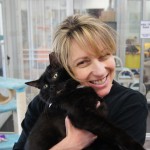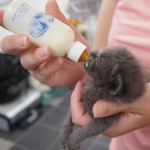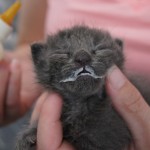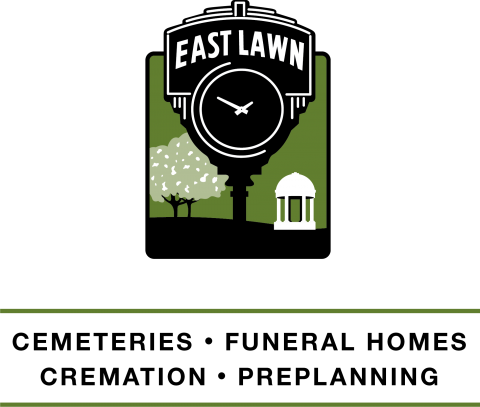Tarzan
The longhaired, blue-eyed punk scaled a 30-foot tree and got himself stuck in the canopy for eight days. He made the evening news. A tree-trimming crew bagged the bad boy and rappelled him down. He then spent time in the pokey until Happy Tails bailed him out. With three of his nine lives ticked off, he is one lucky kitty.
Cats like Tarzan are “second chance cats” and they are Happy Tails Pet Sanctuary’s specialty.
Rescued from an uncertain fate at the Sacramento City Animal Shelter, he was brought to Happy Tails on Folsom Boulevard for a second chance at adoption. He was cleaned up, chipped, checked, vaccinated and neutered.
- Cathryn Rakich
- Chow time
- Got milk?
- Happy paws
- Whiskerama
- Tarzan
Happy Tails always tries to help. “But first do everything you can to help us out,” says Cathryn Rakich, events coordinator. “Ask everyone if they’ll adopt the cat. Try to find the owner. People should know that we are bursting at the seams.”
Established in 1993, and located at 60th and Folsom Boulevard, the Sanctuary is a no-kill facility (all cats are kept until adoption or death, no euthanasia). An all-volunteer team of 300 people, with 50 foster homes, moves a continuing cycle of cats, like Tarzan, through a careful adoption system.
From cage cleaner to board member, there are no paid positions.
Volunteers can work from one to 20 hours a week. There are no set requirements for volunteers. People do what they can.
About 70% of the felines come from the Sacramento area community and about ten percent are rescued from other shelters. These are cats like Tarzan–lots of character and pizzazz that deserve a second chance.
Happy Tails also has an adoption partnership with Pet Smart. The store provides a holding room, bank of cages, food and litter for adoptees. The Happy Tails team maintains the location and shows animals for adoption Saturdays 10-4 and Sundays 11-5 at Arden and Watt.
Kitty out!
A brindled tabby squirmed quickly through an open condo door.
“Kitty out!” several volunteers shouted. The crew hustled to secure the middle and exterior doors to catch the escapee. Speed saved the day and the cat (with a surprised look on his face) was returned.
The Folsom Boulevard site includes exam and intake rooms, a sick bay and a triple secure door system: interior, middle and exterior door.
The residents aren’t kept comfortable in cages, instead there are seven glass walled enclosures, or condos, that divide different populations. One is for the more senior residents, two are for adults and four are for special needs cats.
Special needs include positive tests for cat leukemia, FIV, or social challenges and provides sick cats ‘assisted living’ until they’re back on their paws.
Every room is decorated with toys, cat trees and ample bedding. Cleaners keep the rooms clean and the cats are relaxed.
Kitten season
The saddest time of the year for cats may be spring.
“Traditional kitten season kicks in when the weather warms up,” Rakich said. “It used to be primarily May through July but now it runs late April through September.”
This is the time when unsprayed mom cats give birth to kits that are very hard to place in good homes. The cat population swells, as do deaths and abuse.
Happy Tails kittens are kept in foster homes. On the day this writer visited there was a wiggling carry bag on the floor.
“A homeless man found four abandoned kittens and put them on the conveyor belt at Pet Smart,” said Joelle McChesney, Adoption Center Coordinator. She gently poked a rubber nipple into a grey kitten’s protesting mouth. “These are young, maybe three weeks old.” McChesney will be a surrogate mom, feeding and loving the babies, until they are old enough to be put up for adoption.
The bag of kittens was on its way to a foster home because the sanctuary is not equipped for kitten needs. “Each kitten takes more than $100 to move through the adoption process,” said McChesney.
Life on the edge
Feral cats also fall under the protection of the shelter.
“We have two secret feral cat colonies in Sacramento,” said Rakich. “We practice catch and release – spay and neuter, and feeding. The sites are secret so people won’t dump cats near the area.”
“A hard life does not make a grumpy cat,” Rakich continued, stroking and hugging a chubby black tom named Bronco. He was moved into the sanctuary from the feral population. Purring and limp, Bronco carries a ragged neck scar from a collar that had grown into his skin. His frayed ears and nicks made him look like a hardened felon.
“We have to have thick skins,” said Rakich. “We never get used to (the cruelty). We want all cats to be safe, sound, nurtured and have a home to blossom in.”
We need help
Happy Tails needs any help Sacramento can offer, but it especially needs homes for the cats.
Potential adopters are screened carefully and some balk about the shelter’s no outside cat rule. All new owners must pledge to keep the cat indoors, no exceptions.
“It’s just safer for the cat,” says Rakich.
Rakich ponders the plight of the animals.
“People say it’s not their responsibility… I just found it… or I’m just helping to get it to the shelter… I believe it’s everyone’s responsibility to help these animals.”
By the way, Tarzan, the bad boy acrobat, he’s happy, fluffy, reformed and waiting at Happy Tails for a loving forever-family.
Action
You don’t need to adopt a cat to help. Happy Tails welcomes all kinds of support. Here are some ideas.
- Donations (any amount)
- Join the volunteer program
- Tell a student about the Junior Program for community service credit
- Donate goods, vehicles or make a bequest
- Come to the Barking Lot Sale May 21st 8-2 at 6001 Folsom Blvd.
- Visit the Kitten Adopt-A-Thon, Saturday June 18th 10-2, 30th and B streets
The website at www.happytails.org has complete details. All donations are tax deductible. Happy Tails is a 501(c)(3) non-profit organization.






















 Subscribe In A Reader.
Subscribe In A Reader. Check Us Out On Facebook!
Check Us Out On Facebook! Check Us Out On Twitter!
Check Us Out On Twitter! Visit Nextdoor!
Visit Nextdoor!








